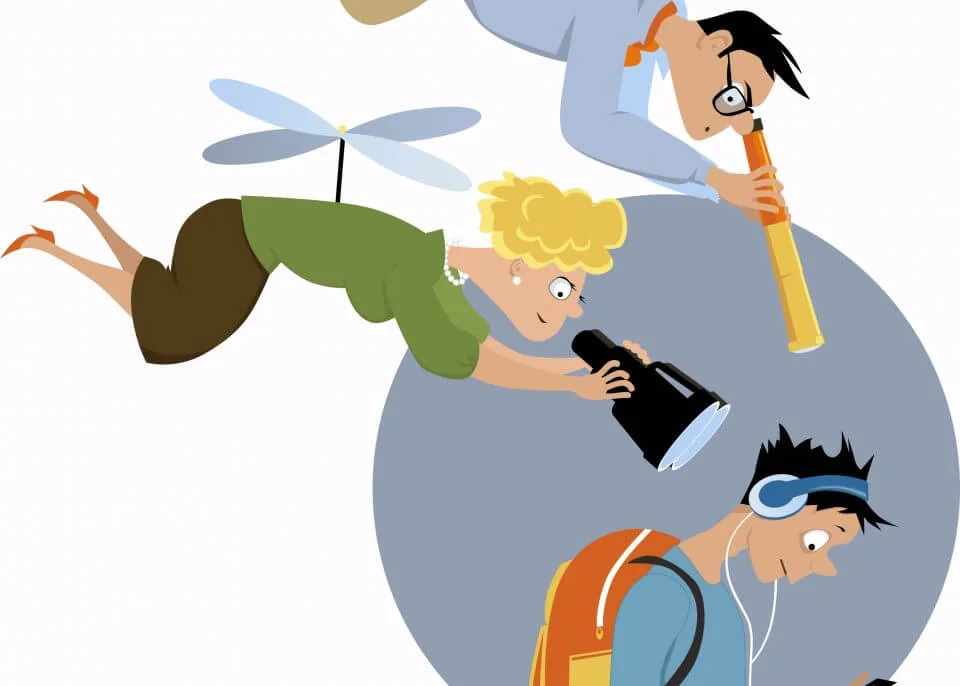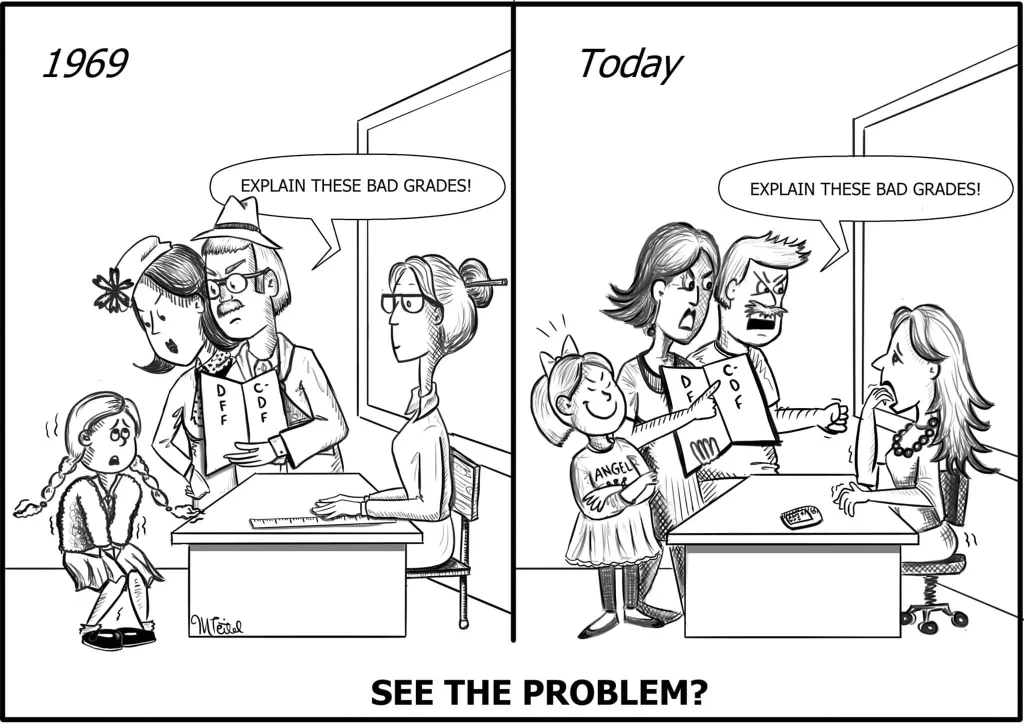Every parent knows two things in particular – the first being that parenting is hard, and the second being that there is no standard instruction manual for parenting. Parents are just ordinary people, but in the eyes of their children, parents are looked up to as role models and heroes. It is because of this that those parents feel the need to provide the best for their children.
With parents having been in the world much longer than his or her child, the parents definitely know much more than their child about the hardships, tragedies, and unfairness present in the world outside their house and lot. As a result, many parents strongly feel that they should protect their own children at all costs – but is there an extent to which such protection does more harm than good. This kind of parenting branches out into two kinds of parenting styles: helicopter parenting and lawnmower parenting.

Helicopter Parents | Photo from nyci.org
Helicopter Parenting
Helicopter parenting is best described by the idea of parents “hovering over their children like a helicopter.” Supposedly coined in the 1969 book Parents & Teenagers by Dr. Haim Ginott, helicopter parents are “overly engaged with and focused on” their children, to the extent that every move of the child is monitored and directed under the supervision of the helicopter parent. With the intentions of ideally helping their child succeed and to prevent failure, disappointment, and conflict, helicopter parents go out of their way in most, if not all cases, to assist their children.
Helicopter parents “hover over their children” so that the best outcome is always achieved for their kids. Examples of helicopter parenting are when helicopter parents always monitor their child’s grades wherein the child gets various kinds of special assistance; ensuring that the child always gets good grades by always providing too much help with homework, ensuring that the child gets a specific teacher, and the like. Helicopter parents even do the child’s tasks within their house and lot that the child can do by themselves, such as washing dishes. There are also cases wherein the helicopter parents monitor who becomes their child’s friends and what activities or events the child engages in. The helicopter parent bombards the child with assistance so much to the point wherein the child has no more alone time. Children benefit from having involved parents, however, too much involvement doesn’t lead to good things or even possibly, good behavior.

Lawnmower Parents | Photo from tallikimelman.com
Lawnmower Parenting
Lawnmower parenting may seem similar to helicopter parenting in the sense that the parents are “overly involved” in their child’s life. However, what makes lawnmower parenting distinct is that lawnmower parents do not just provide excessive amounts of assistance to their children. Instead, lawnmower parents “mow down” any and every conflict that the child could ever encounter, whether it is inside or outside their house and lot.
Examples of this parenting style are typically much more severe than helicopter parents. One example is when a lawn mower parent calls a teacher or professor to ask for an extension on a project deadline on behalf of their own child. Another example is arguing for their child’s sake against teachers and school faculty, whether it’s about grades or conduct, no matter what facts are present. It can even reach the extent wherein it’s the lawnmower parents themselves who are calling employers for their child’s job applications. The lawnmower parent completely takes away the child’s capability to actually face any challenge.
The Roots of Helicopter/Lawnmower Parenting
The reason why parents adopt a helicopter parenting or lawnmower parenting style is because of great fear of disaster and negative consequences that could happen to their child. These kinds of parents believe that their intentions of wanting the best for their child justify everything that they do. However, it reaches an extent wherein the very things that the helicopter/lawnmower parents don’t want their children to experience – significant conflicts, failures, disappointments, hardships, rejections – are valuable life experiences that their children must go through in order to grow as a person.
Helicopter/lawnmower parents are well aware of the state and issues of the world outside their house and lot, economy, job market, and the like; and their knowledge of these things contributes to the anxiety they have towards their children. These parents get worried about what may happen to their child if they (the parents) are not there anymore. Helicopter parents tend to justify the idea that assistance is not a bad thing, rather than it should be viewed as a good thing since it’s purposed to “help” their child towards achieving success. On the other hand, lawnmower parents believe that if it’s a problem they can solve for their child, then it’s supposed to be a good thing if they (the parents) can just “mow down” the problem for the child. Both parenting styles are fueled by their worries for their children.
When parents see another helicopter/lawnmower parent implementing a helicopter parenting or lawnmower parenting style, it usually evokes thinking that perhaps there is more that should be done for one’s children. Parents that are “overly involved with their children” seem productive on the surface, which is why parents may feel that they’re not doing enough when observing helicopter/lawnmower parents either from school or neighbors near their house and lot. However, the “excessive monitoring and engagement” from helicopter/lawnmower parents stems from their own past growing up – stemming from lack of attention, neglect, and strong feelings that their own parents didn’t love them enough growing up.

Helicopter/Lawnmower Parenting Brings Harm
Given this, the foundation on which helicopter/lawnmower parenting is grounded is one filled with anxiety and worry. Excessive “hovering” over your child and “mowing down” all of their problems for them takes away crucial experiences where the child could improve their capability for strategy and critical thinking. And without the important life skills that a child has to hone in life, there isn’t much they will be able to do independently outside of their house and lot. How can your child ever appreciate what success is if they’ve never experienced struggle? Perseverance is not something that can be taught, for it is something that has to be learned by the child through rejections and failures. It is through hardships that your child becomes stronger. It is through conflicts that pull your child outside of their comfort zone that makes your child mature into someone who can become independent.
Too much involvement could even lead to unforeseen self-esteem or child development problems in the future when they get older. As they’ve been spoon-fed through every challenge in life, the child will be more dependent on their parent. Sometimes, leaving them to struggle and fix solutions on their own will make them better.
How to Become Better Than a Helicopter/Lawnmower Parent?
Let your child make mistakes. It is part of life to fail and get hurt. The more a child is monitored, assisted, and pampered by their parents, the fewer skills that child will have to face the hardships that life has to offer them, especially when it comes to what’s waiting for the child outside their house and lot. The child has to learn how to go through hard times so that the threshold on which they can handle stress is strengthened. Moreover, hardships are venues for the child to work on important life skills – from something as simple as washing dishes to something as big as achieving success in their career after many failures. Having their parents be there to make things go alright when circumstances go bad will make the child develop a sense of entitlement, and this means that the child will start to believe that things should always go their way. However, life does not always go anyone’s way all the time, and the child must learn how to live with this truth.
It is a known concept that there will come a time when the parents will pass away and the child is left to carry on in life. The ultimate responsibility placed upon parentsis to gear their children up for a life where the child can live independently and happily, towards a purpose that is fulfilling and positive.


